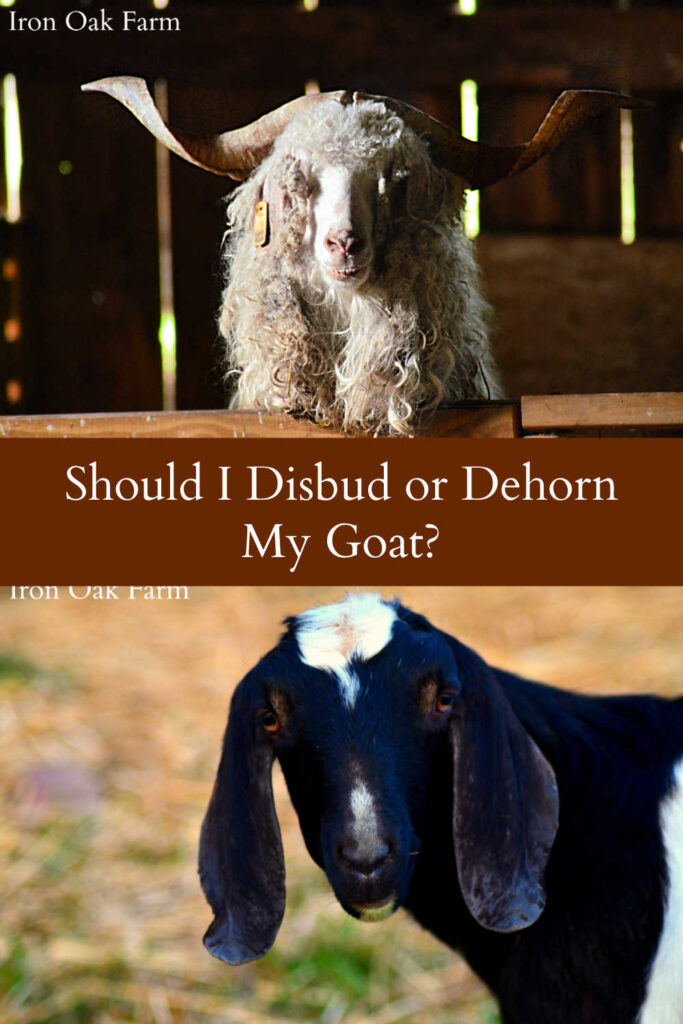Should I Dehorn or Disbud My Goat?
It is my hope that this post will answer the question; Should I dehorn or disbud my goat? Horns are one of the most debated topics among goat owners. There are people who feel really passionately that it is a cruel and unnecessary process. And there are people who believe it is irresponsible and dangerous to the goat not to de-horn. I believe both of these arguments come from a place of concern for the goat's well-being. And honestly, I can see both sides. I feel that each homestead has to do what is right for them and what they believe is right for their goats. So below, I hope to flush out the positives and the negatives of owning goats both with horns or without. And hopefully, after reading, you can make the best-educated decision for your herd.
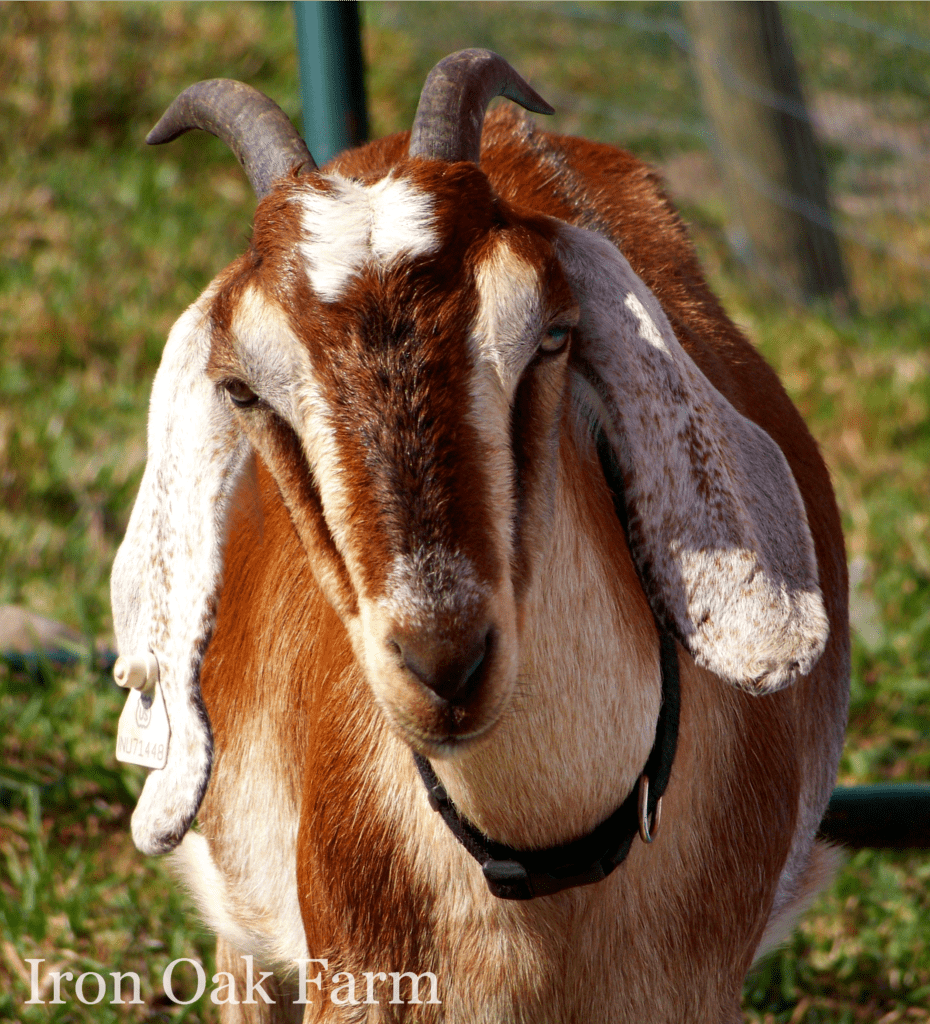


My experience with both horned and hornless goats
I've been raising goats since 2009. In 2009 our family computer still had dial-up internet. So needless to say, there was not a plethora of information about raising goats at my fingertips. To be honest, there's still not a whole lot of information out there about raising goats. Chickens? Good Lord yes! Cattle? Yes! Goats?...not so much. We didn't live in a farming community, my family was by no stretch of the imagination farmers, so other than 3 books that I repeatedly checked out from our community library...as far as goat husbandry...we were winging it!
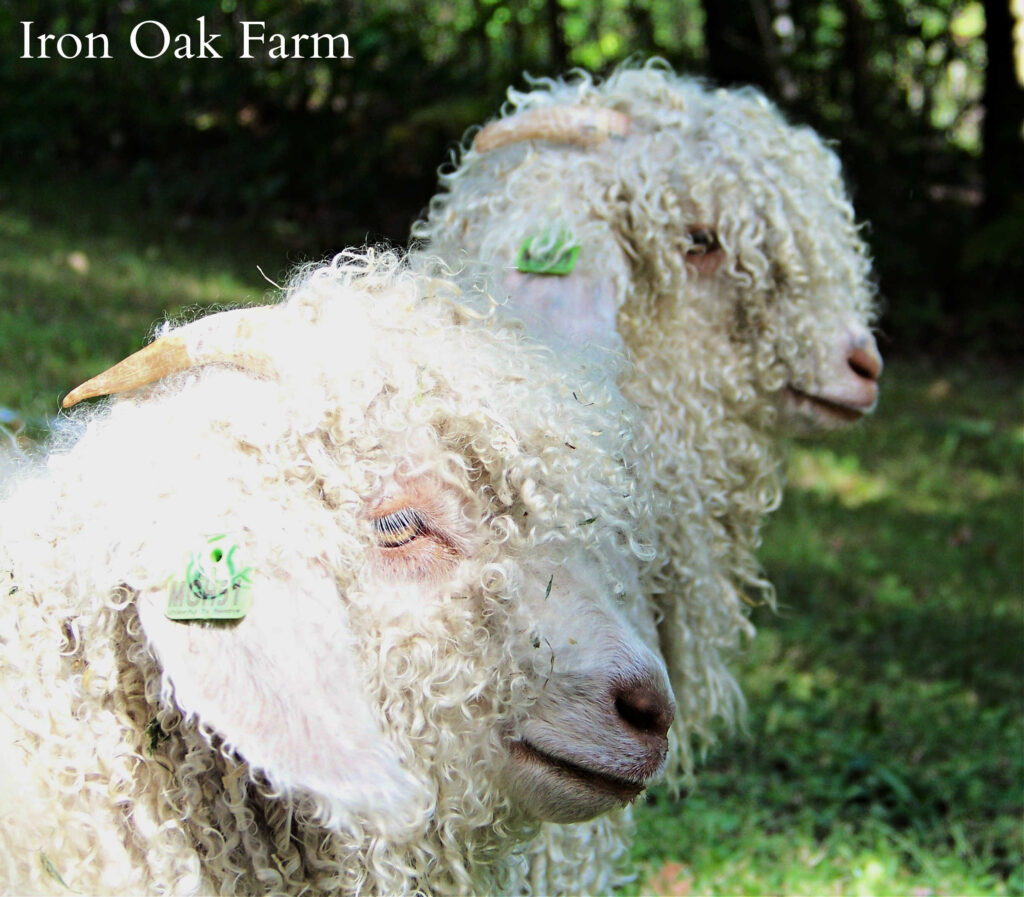


Our first goats were a pair of Angora doeling sisters. They were curly, soft, and sweet. They came with horns and I never gave them a second thought. A year later we brought 2 Nubian doelings to our farm. The man who was selling them asked us if we wanted their horns removed. I had no idea, but it sounded cruel so I said no. This was the first time I realized that goats without horns were an option.
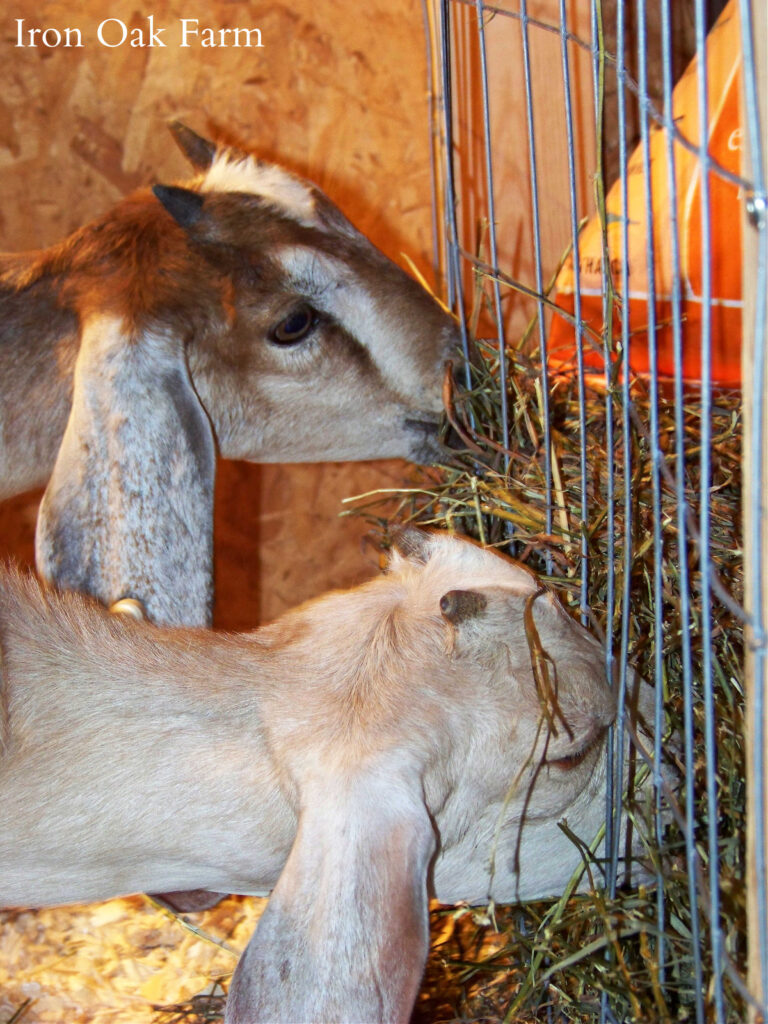


Fast forward to the present day. Over the years I've learned a lot about goats with horns vs goats without horns. I've raised both. Our Angora buck Sulley lived to be 13 and he had the most impressive horn display I've ever seen.
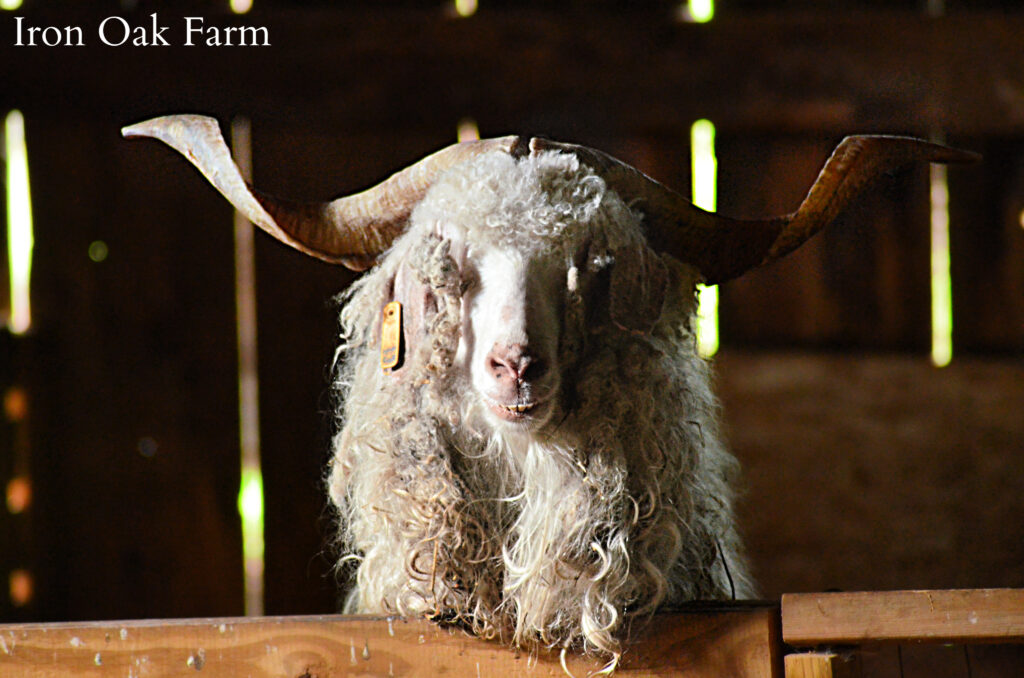


My experience
On the other hand, I've also successfully disbudded every dairy kid that we've raised on our farm. (I looked through our farm records and that's about 32 goats) I feel like I have a pretty good experience with both sides of the horn debate. And my feeling is that there are times when it is absolutely appropriate to disbud a goat. And there are times when it is not appropriate. However, I do recommend that it's something you figure out before you get goats. Hopefully, this article can help.
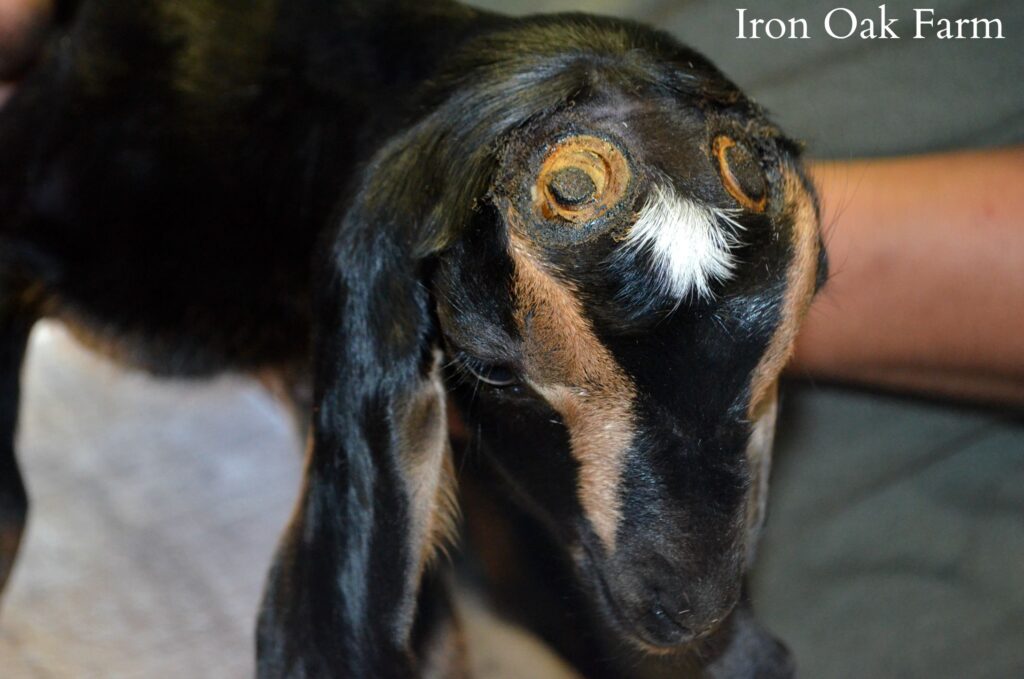


Goat Horn Terms:
disbud- The process of blocking the blood supply to the horn bud before the horn breaks through the skin of the goat. This is done with a circular hot iron or caustic paste. My How To Disbud A Goat article will show you just what we do.
dehorn- This is the process of removing a horn that is already growing. It is a much more involved procedure.
polled- Some goats have been genetically bred to be naturally polled. This means they will genetically never grow horns. This is not very common, though it is gaining popularity. Most goats for sale will grow horns.
scurs- Scurs are a result of an improper disbudding procedure. Either the goat was disbudded too late or the blood supply was not completely severed, so part of the horn will still grow. It usually grows in odd ways, curling, or backward, sometimes toward the head of the goat. This can cause other health concerns. They often have to be trimmed, which presents a whole set of other obstacles.
The anatomy of a horn
Horns are made of three layers; the outside of the horn is made of hard keratin, the same material that fingernails are made of. Just under the keratin layer is a blood supply that connects the horn to the skull of the goat. The inside of the horn is called the core which is also connected to the skull. This is why after the horn has broken through the skin, the dehorning process becomes more complicated.
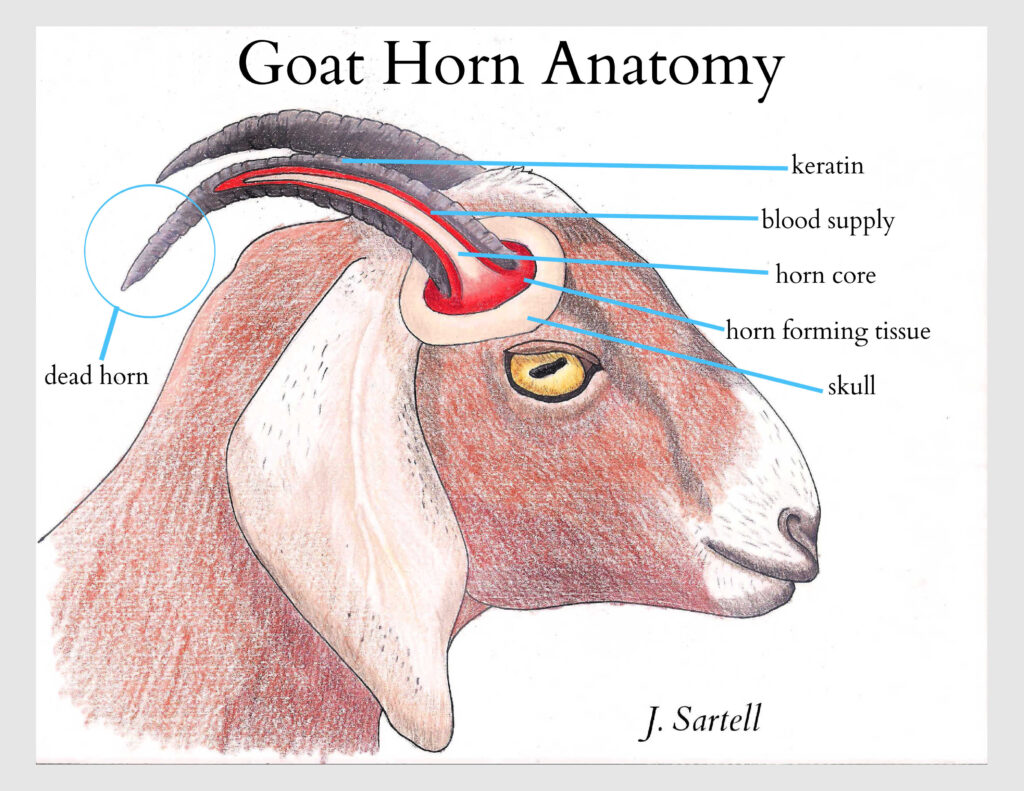


Both male and female goats have horns. The female will have smaller horns and they may grow in a different shape/direction from an intact male. Wethers often have the same horn pattern as females.
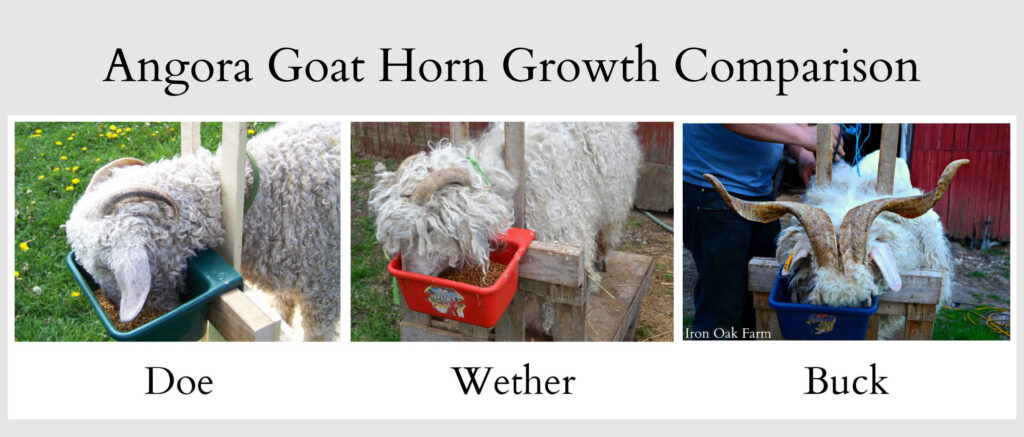


How does a goat use its horns?
In the wild all the goats have horns. So what do goats use them for? Horns, especially in bucks, are a display of rank and are used to impress females. Goats also use horns to defend themselves. They can butt, and ram or try to hook a predator with a horn. Think head swords.
One of the lesser-known functions of a horn on a goat is its ability to regulate body temperature in the heat. The horns act as a cooling system for the goat. The blood flow to the horn carries heat from the goat's body to the horn. As cool air runs over the horn, it dissipates excess heat from the goat.
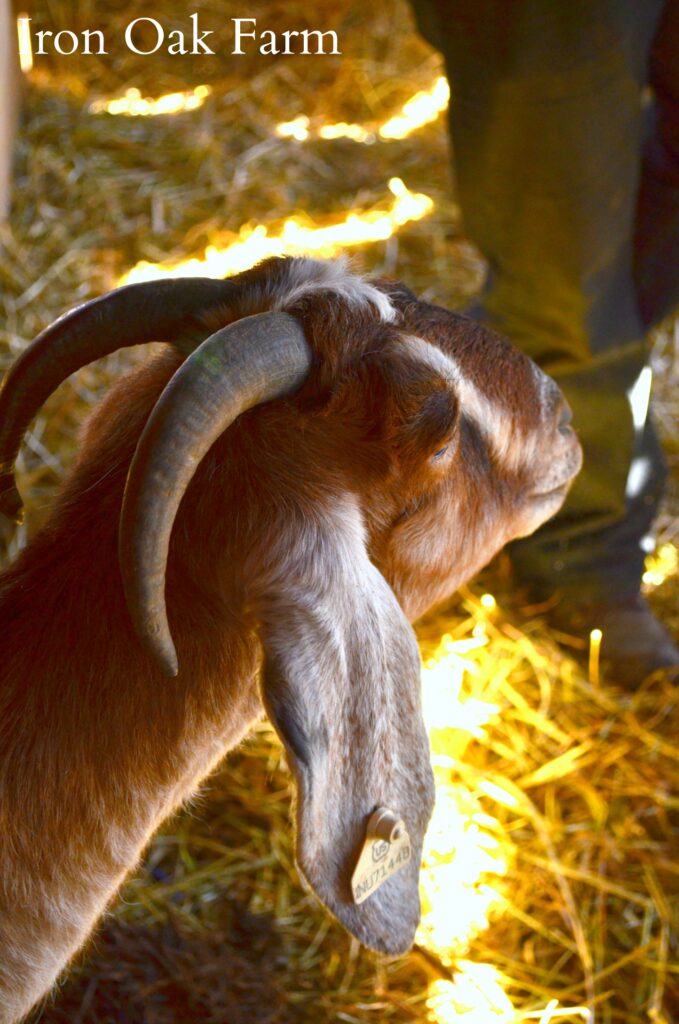


Fiber goats are never dehorned
Angora goats produce one of the warmest fibers in the world. They also produce this fiber so quickly that, unlike sheep and alpacas, they are shorn twice a year. In the spring and in the fall. That means, regardless of the temperatures outside, all summer long they are growing an extremely warm fleece. If you remove the horns from an Angora goat it will most likely die of heat stroke in the summer.
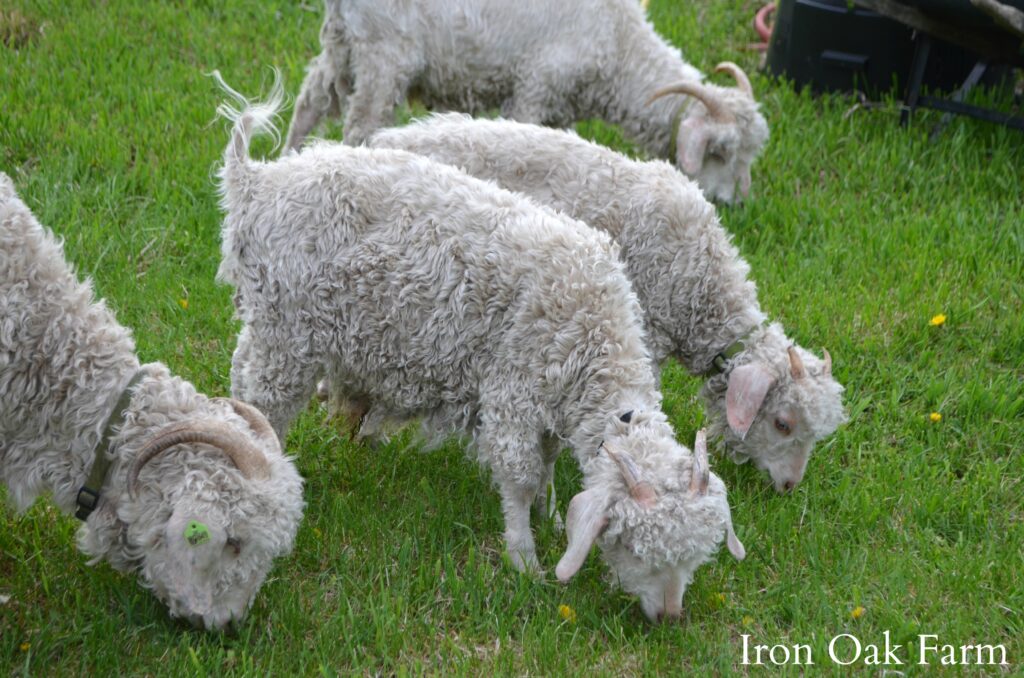


All of our angora goats have horns. Our buck Sulley had a curling set of horns sticking straight out on either side of his head. Each one was around 18 inches long. That's 36 inches of sword sticking out from his head added to all the rambunctiousness of a large to mid-size goat. I was never hurt by Sulley. It was as if he was very aware of his horns and was one of the gentlest goats we ever owned. I was however hurt several times, by our in-tact female Nubian goat Greta who was a nutjob!
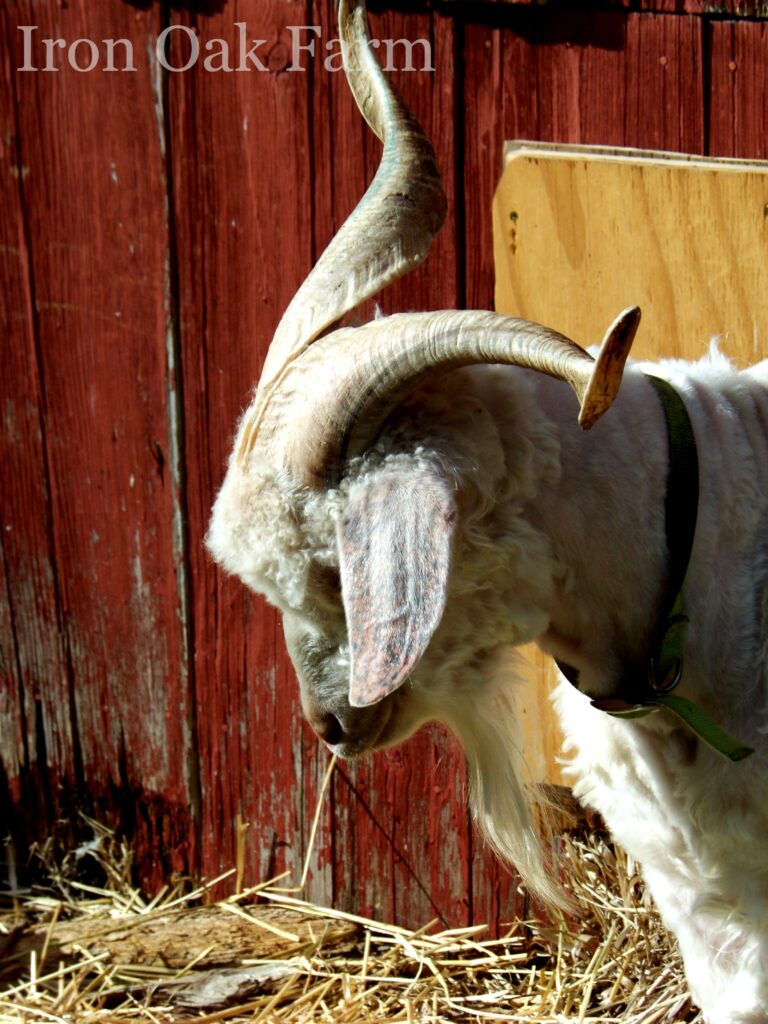


Is it cruel? Unnatural?
In the wild, goats don't live in fenced pastures. When you domesticate an animal, often there are sacrifices that take place because the living environment for that species has changed. Fences and goats with horns can be a dangerous combination. One of our Angora does caught her horn on a fence while we weren't home. We came home to a bloody mess that could have cost her her life. Luckily the outer shell of the horn broke free before the whole horn cracked. She could have easily bled to death.
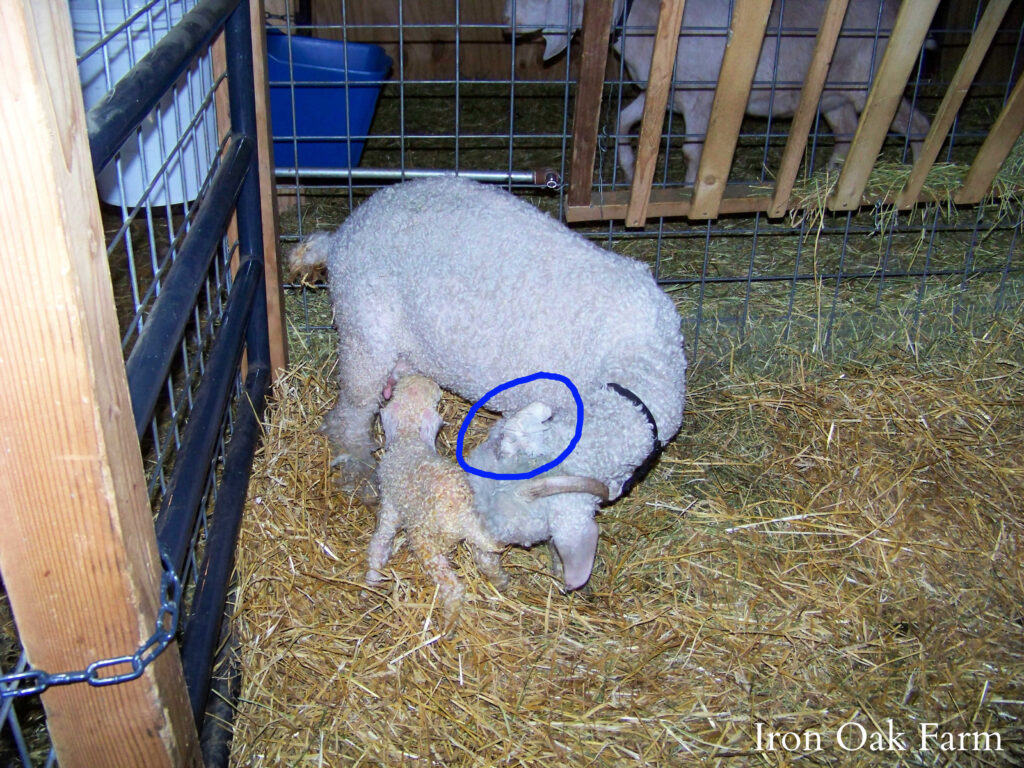


But with domestication, there are benefits to the animals as well. Goats in the wild die of starvation or freeze to death. They're not fed sweetened molasses grain twice a day, alfalfa hay, black oiler seeds, mineral blends, and probiotics. They don't have warm barns with fluffy straw to curl up in the winter. Goats in the wild die and suffer in different ways. And that's nature. Domesticated animals are no longer a part of nature. And because of this, we as animal stewards have to make hard decisions for the long-term benefit of the animals we keep.
Yes, dehorning or disbudding is painful, and it's my least favorite part of goat ownership. I get a terrible adrenaline release after disbudding is done. It's emotional and mentally taxing. This is why I encourage you to decide before you get goats what you think will be best.
Some questions to ask yourself before you get goats:
-Are you prepared to deal with a horn injury?
-Are you prepared to disbud kids born on your farm?
-Do you have access to a livestock vet?
-If you answered "no" to the above, do you have someone you can hire to disbud your goats for you, or to help you deal with any horn issues on your homestead?
Arguments in favor of horns
-Horns are part of the natural anatomy of a goat. They're supposed to have horns, just as humans are supposed to have fingers. They serve several functions in the body.
-It's painful for the goat to have its horns removed. No matter what process you choose, removing the horns of a goat is painful. There is not a lot out there in veterinary help that will help to alleviate this pain. In my experience, most vets don't want to deal with horns unless there's an injury or something else that's life-threatening.
-You can raise goats with horns (as I have) and live to tell the tale.
-It's hard to find someone who will disbud your goat kids. It's also an intimidating job to do yourself. ( I have a post coming about how to disbud your kids yourself) It's my least favorite part of goat ownership. I always feel emotionally drained after I've disbudded our kids. It's a lot easier just to not.
-If you live in a very hot climate, or with little shade you may want to think about leaving your goat's horns intact. It will help them more easily deal with the heat.
-Horns can be helpful in maneuvering goats in an emergency situation. You can grab the horns and direct them.
-All fiber goats should have their horns intact.
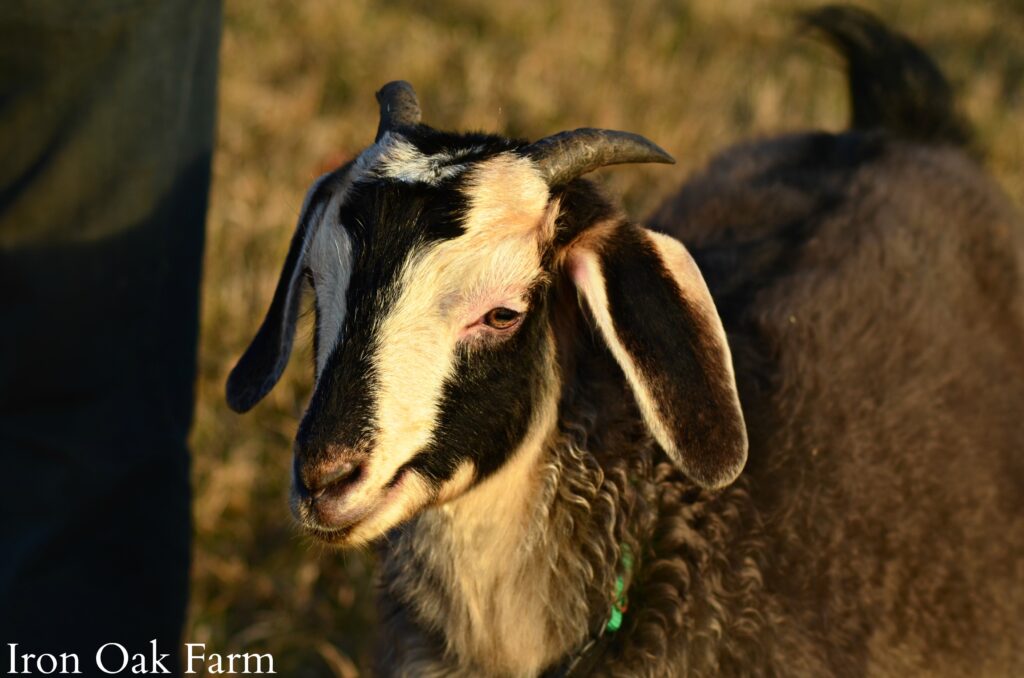


Arguments against horns
-Goats with horns can be dangerous to other goats, animals, or people on your farm. Whether they intentionally fight or accidentally catch you, there is a chance of injury. One of the primary uses of a horn for a goat is for defense. When our golden retriever goes out to the barn, the goats all line up along the fence with their heads forward ready to charge him.
-Horns can be especially dangerous around children. Many goat breed's horns are at eye level to a child.
-The bigger the goat, the bigger the horn. Large breeds can be especially dangerous with horns intact.
-It's harder to sell a goat with horns. If you have dairy breeds then you will need to breed your does often, and that means kids. Not a lot of homesteads have the means to keep all the kids your goats birth. So you will need to sell some of the offspring. The majority of people buying goats want kids that are disbudded.
-Shows/4-H. Most goat shows will not allow goats with horns unless they are a fiber breed. Last I checked this included 4-H. (Someone let me know if this has changed down in the comments.) So if you're selling your goats to kids who want a 4-H project, you will need to disbud them.
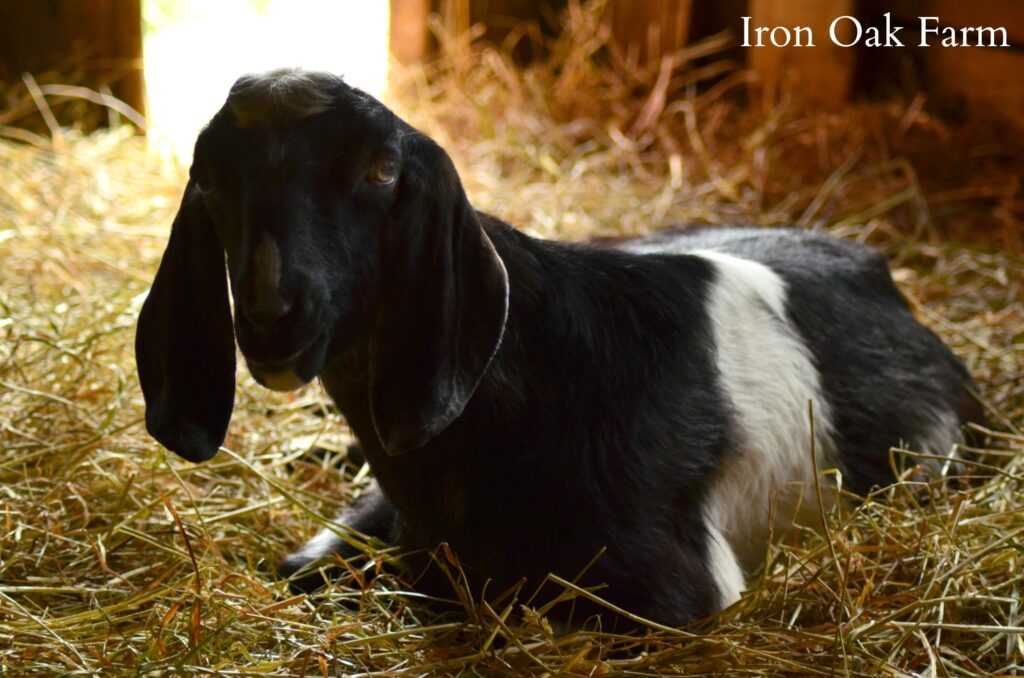


Shop this post!
This post may contain affiliate links which means I make a small commission on any purchases your make through my link. It does not cost you anything.
Pin it for later!
